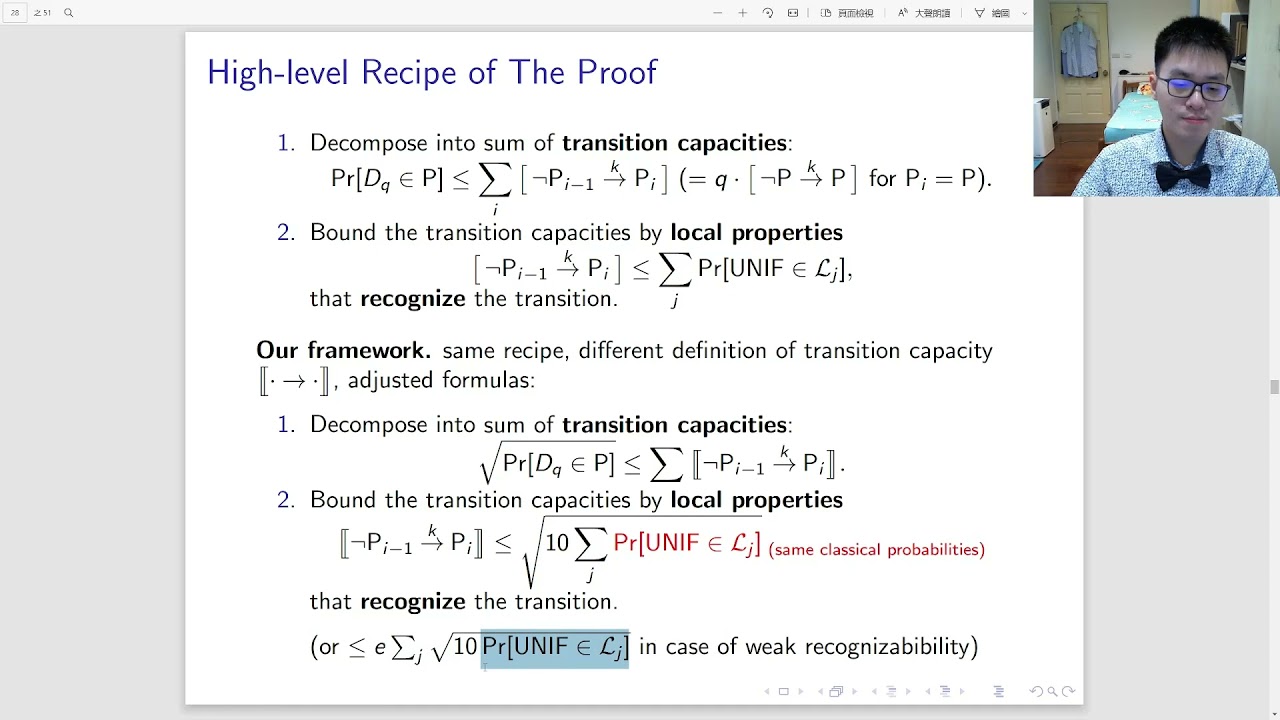Welcome to the resource topic for 2020/1305
Title:
On the Compressed-Oracle Technique, and Post-Quantum Security of Proofs of Sequential Work
Authors: Kai-Min Chung, Serge Fehr, Yu-Hsuan Huang, Tai-Ning Liao
Abstract:We revisit the so-called compressed oracle technique, introduced by Zhandry for analyzing quantum algorithms in the quantum random oracle model (QROM). This technique has proven to be very powerful for reproving known lower bound results, but also for proving new results that seemed to be out of reach before. Despite being very useful, it is however still quite cumbersome to actually employ the compressed oracle technique. To start off with, we offer a concise yet mathematically rigorous exposition of the compressed oracle technique. We adopt a more abstract view than other descriptions found in the literature, which allows us to keep the focus on the relevant aspects. Our exposition easily extends to the parallel-query QROM, where in each query-round the considered quantum oracle algorithm may make several queries to the QROM in parallel. This variant of the QROM allows for a more fine-grained query-complexity analysis of quantum oracle algorithms. Our main technical contribution is a framework that simplifies the use of (the parallel-query generalization of) the compressed oracle technique for proving query complexity results. With our framework in place, whenever applicable, it is possible to prove quantum query complexity lower bounds by means of purely classical reasoning. More than that, we show that, for typical examples, the crucial classical observations that give rise to the classical bounds are sufficient to conclude the corresponding quantum bounds. We demonstrate this on a few examples, recovering known results (like the optimality of parallel Grover), but also obtaining new results (like the optimality of parallel BHT collision search). Our main application is to prove hardness of finding a q-chain, i.e., a sequence x_0,x_1,\ldots,x_q with the property that x_i = H(x_{i-1}) for all 1 \leq i \leq q, with fewer than q parallel queries. The above problem of producing a hash chain is of fundamental importance in the context of proofs of sequential work. Indeed, as a concrete application of our new bound, we prove that the ``Simple Proofs of Sequential Work" proposed by Cohen and Pietrzak remain secure against quantum attacks. Such a proof is not simply a matter of plugging in our new bound; the entire protocol needs to be analyzed in the light of a quantum attack, and substantial additional work is necessary. Thanks to our framework, this can now be done with purely classical reasoning.
ePrint: https://eprint.iacr.org/2020/1305
Talk: https://www.youtube.com/watch?v=2jNqxWwcEXk
See all topics related to this paper.
Feel free to post resources that are related to this paper below.
Example resources include: implementations, explanation materials, talks, slides, links to previous discussions on other websites.
For more information, see the rules for Resource Topics .
